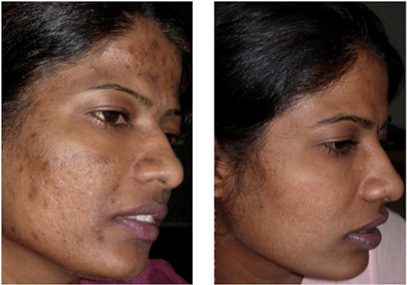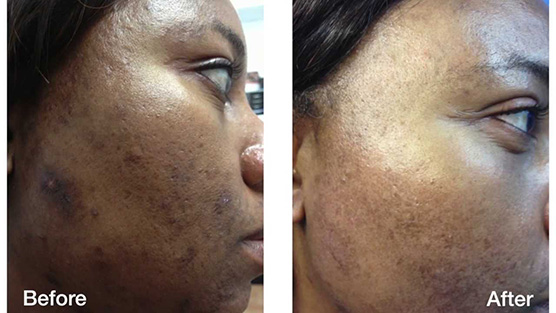
Feel healthy and beautiful in your own skin
Skin Discoloration Treatment For Dark Skin in Seattle, WA
Post-inflammatory Hyperpigmentation
Also called Dark Spots or Discoloration
You may notice a spot of darker skin after the healing process following an injury. Dark spots can also appear after acne, eczema, or other rashes heal. In skin of color, this is a common reaction called post-inflammatory hyperpigmentation or PIH. PIH fades over time, but the darker the PIH, the longer the fading period may last.
Here at Advanced Dermatology and Laser Institute of Seattle, we can help you restore your skin to its natural pigment. Prescription medicines, chemical peels, laser therapy, and medical-grade facials may help. Avoidance of the sun and daily use of SPF 30 broad spectrum sunscreens are also recommended for reducing the appearance of hyperpigmentation.


Melasma
This common condition causes dark patches of pigment typically found on the face, but sometimes on the forearms and neck as well. Although it is most prevalent in women who have Latina, African, or Asian ancestry, men are susceptible to Melasma, too. Melasma may be associated with genetics, pregnancy, certain methods of birth control, or estrogen replacement therapy.
Melasma can fade on its own, but it often recurs. Protecting your skin from the sun with sunscreen, hats, sunglasses, and clothing helps to reduce the appearance of Melasma.
Vitiligo
This is a condition in which a person’s body destroys the cells that give their skin its pigment, resulting in a loss of skin color. The amount of color lost varies as does the area on the body involved. Some people have small patches of lighter skin, while others have porcelain white spots. It is not possible to predict how much skin color a person will lose.
Pityriasis Alba
This skin condition, which causes round, light patches of skin covered with white scales, is particularly common in children. The patches can occur on all or part of the body, but they are most likely to develop on the face, neck, trunk, or arms. This condition is not Vitiligo, and it will never become Vitiligo. The patches often disappear without treatment. Most children no longer have patches by the time they become an adult.
Moisturiser and sunscreen can help to clear the patches.
Medication
Taking certain medicines can cause skin discoloration or dark patches, especially in people of African or Latino descent. Medicines that can cause discoloration include those taken for high blood pressure, diabetes, and heart disease.

Do not stop taking a medication without consulting with a licensed medical doctor. If you take medicine and notice discoloration, talk with the doctor who prescribed the medication.
